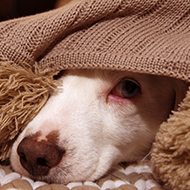Dogs Trust seeks participants for fireworks study

"There are indications that dogs may be sensitive to sounds that humans can't hear, so we are interested to find our if it's not just the loudness ... but other acoutstic characteristics" - Dr Zuzanna Podwinska, University of Salford.
Dogs Trust, in collaboration with the University of Salford, is calling on volunteers to take part in a study into how fireworks and loud noises affect dogs.
Both dog owners and non-dog owners are required for the study, and can take part by completing a short survey.
The survey, which will be available from 31 December 2022 to 8 January 2023, will collect responses on New Year's Eve fireworks.
Some dog owners will also be selected to record the sound of fireworks, which the research team will then use to extract the acoustic features to determine how sound characteristics affect dog behavioural responses.
Dr Sara Owczarczak-Garstecka, leading the study, said: “Research is a vital part of Dogs Trust’s work. It helps us make sure that the work we do and the advice we offer is based on evidence and can benefit and improve the welfare of dogs. All our research is carefully designed to prevent any negative impact on dogs.
“Nearly half of dogs in the UK are estimated to be negatively affected by fireworks. To build on our expert advice to support owners on how to help their dogs cope with the noise of fireworks, we need to develop an in-depth understanding of different dog behaviours in response to hearing fireworks.
“This includes how different acoustic features of fireworks impact dogs. We hope to have many volunteers take part in this exciting study, which will benefit dogs by enabling us to generate evidence-based advice for owners on how best to help their four-legged friends cope with fireworks.”
The charity is seeking participants for three different aspects of the study, and further information on each of these aspects can be found on the Dogs Trust website.
Those interested in taking part in the study can register by completely this online form.



 The RCVS has announced a new version of its 1CPD mobile app, with enhanced features for veterinary surgeons and veterinary nurses to record their continuing professional development.
The RCVS has announced a new version of its 1CPD mobile app, with enhanced features for veterinary surgeons and veterinary nurses to record their continuing professional development.